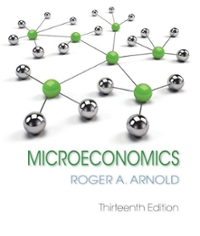First person says: People are always advancing theories to explain this or that. They advance theories to
Question:
First person says: “People are always advancing theories to explain this or that. They advance theories to explain things like the climate, crime, rising unemployment, poverty, and so much more. I only accept those theories that sound reasonable or right to me. “
Second person says: “I agree. You have to use your common sense when deciding who has the right theory. For example, if someone comes up with a theory that says that ‘little aliens in a faraway galaxy are controlling our every move,’ that sounds just ridiculous. No need to accept that theory.”
Hear what and how the economist thinks:
Using the criterion of accepting a theory only if it “sounds reasonable” doesn’t always guarantee that we will get things correct.
To illustrate, suppose you lived 500 years ago and someone proposed the flat Earth theory. That theory essentially says that the earth is flat. Probably everyone 500 years ago would accept that theory because it “sounded reasonable.” Fact is, though, the flat Earth theory is wrong: the Earth is not flat.
Now consider a theory which, upon first hearing it, might sound unreasonable. Albert Einstein proposed the theory of general relativity in a paper published in 1916. The theory stated that Sun’s gravity would bend light. For many people, that might “sound unreasonable,”
thus, they conclude, it is wrong. But how a theory “sounds to us” is not the right criterion by which to evaluate a theory. For Einstein, as for many scientists, it is how well the theory predicts that matters. As a test of his theory, he predicted that a photo taken during a solar eclipse would show that the Sun’s gravity would bend light. Specifically, starlight passing near the Sun would bend, and the stars would show up in just slightly the wrong place. Pictures of There are plenty of examples of theories that “sound reasonable”
that turn out to be wrong and theories that “sound unreasonable”
that turn out to be right. Because of this, we need something better than “how a theory sounds to me” as a criterion by which to evaluate theories. Generally, economists use the criterion of how well a theory predicts when evaluating theories.
Questions:
1. Can you think of a theory that “sounded reasonable” to you that turned out to be wrong? Can you think of a theory that “sounded unreasonable” to you that turned out to be right?
2. Two people consider the validity of theory A. If both people use the “sounds reasonable” criterion by which to evaluate the theory, will both people necessarily agree as to whether the theory is correct or not? Explain your answer.
Step by Step Answer:






